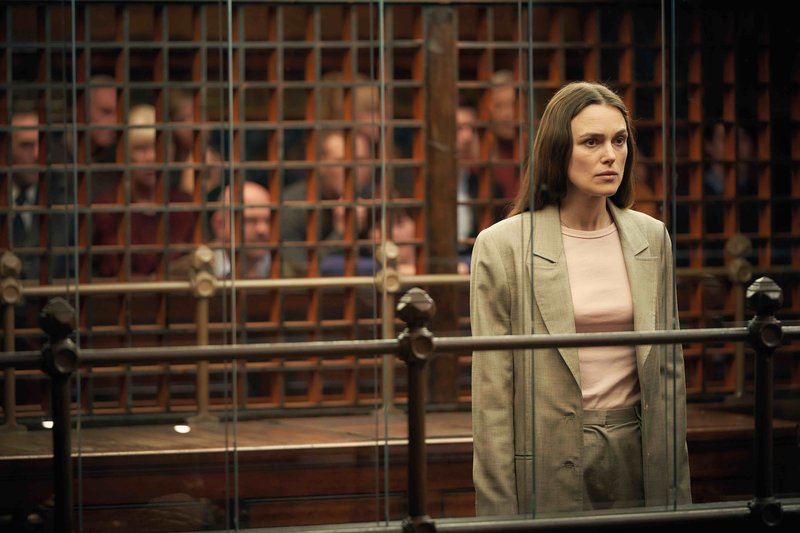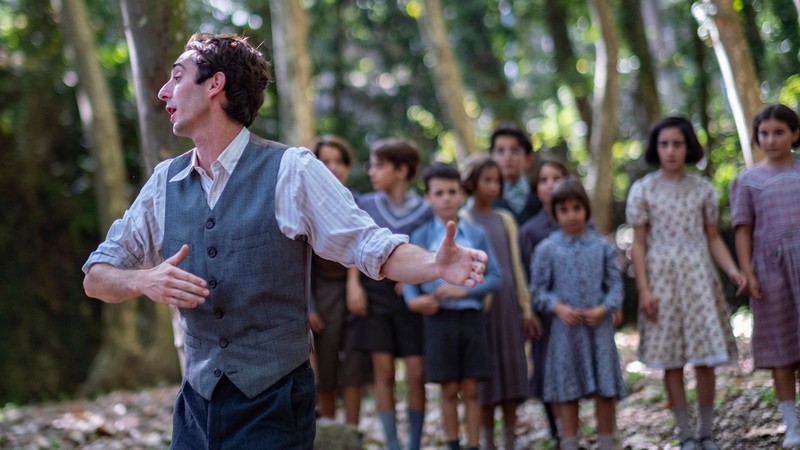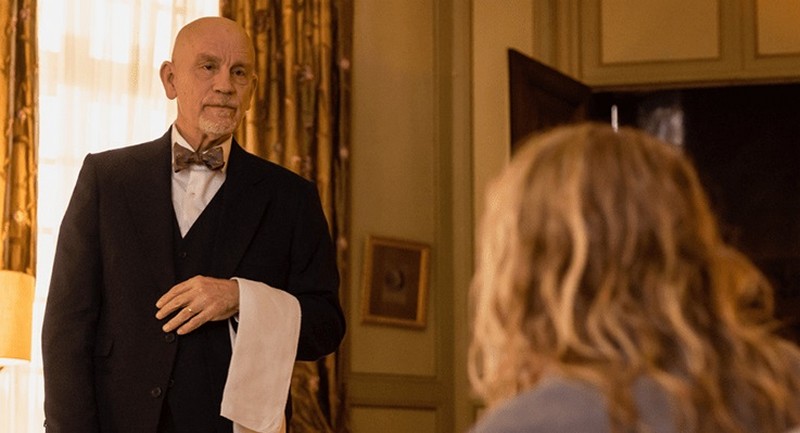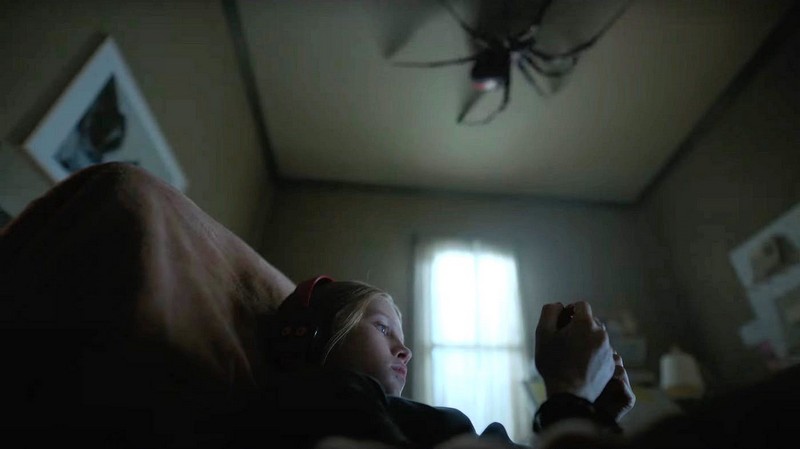The 6th British Film Festival is the biggest yet. Running across seven cities (most until 24th November, 2019) and 19 cinemas, it showcases 30 films, including 16 Australian premieres.
Below are reviews of some of those premieres. To download the program, for more information and bookings, go to www.britishfilmfestival.com.au

Official Secrets (MA) – 112 minutes
Lies. State-sanctioned lies underpin a political thriller. The lies cost as many as a million lives. The US and the UK are looking to justify starting a war in Iraq. They want to do so with or without the backing of the UN, which wasn’t forthcoming. They do so on the pretense that the Iraqis have weapons of mass destruction.
On 25th February, 2004, Katharine Gunn (Keira Knightley) is brought to trial for breaching the Official Secrets Act. A year earlier, in January 2003, the USA and Britain are aggressively seeking a UN resolution to invade Iraq.
With her husband Yasar (Adam Bakri), at their home in Cheltenham, England, Katharine watches news reports of British Prime Minister Tony Blair claiming “war is inevitable”. She is a Mandarin translator at Government Communications Headquarters (GCHQ).
There, she and others receive a classified e-mail, which turns out to be a US directive to spy on UN Security Council members from five countries, with a view to coercing them to sanction war in Iraq. Katharine adopts a moral stance (she is aggrieved) and takes matters into her own hands, sparking a scandal.
Keira Knightley remains at the top of her game, playing intense and passionate with credibility. Around her the other key cast are also suitably vitriolic. Rhys Ifans is a standout as a slightly deranged journo – Ed Vulliamy– on a mission. Matt Smith may be more by the book, but he is utterly credible as investigative reporter Martin Bright, who knows he is on to a huge scoop. So, too, Matthew Goode as his support, Peter Beaumont. There is an authority in both their performances.
I love the old-style journalistic confrontations that underpin the dilemma faced by The Guardian editor. Also strong is the Human Rights team that take up Knightley’s case, led by the measured but convincing Ralph Fiennes as Ben Emmerson.
If you are of the belief that what the historical record deserves is the truth then you will find much to like in Official Secrets. The truth may not be pretty but when there is so much at stake the bar is raised particularly high … as it is here. Gavin Hood, who also co-wrote the piece with Gregory and Sara Bernstein, based on a book by Marcia and Thomas Mitchell, has extracted drama and pathos from a real-life situation.
Military Wives (M) – 112 minutes
Imagine you are the wife or partner or child of a member of the military who is sent off to war. How would you feel in the lead up to and during the period your loved one is in battle? Clearly you would be thinking about whether or not he or she would return safely and in one piece. Military Wives is inspired by the true story of a group of women who have been left behind in just the circumstance I have described. In their case, their husbands were in Afghanistan.
The wives of the two officers, Kate (Kristin Scott-Thomas) and Lisa (Sharon Horgan), are in a power struggle. They are very different women and approach their lives differently. Lisa is populist and impromptu, Kate highbrow and proper. What they have in common though is a desire to keep the other women busy, distracted and engaged. To that end, they form a singing group, although – again – they have different ideas of what that means and what they are looking for. It becomes the first UK military wives’ choir.
From a very shaky start, the songstresses make their presence felt, notwithstanding the fact that the ladies continue to think of their nearest and dearest in battle. While Kate doesn’t let down her guard and keeps a stiff upper lip, she is still coming to terms with the death of her son. Lisa, on the other hand, struggles to connect with her teenage daughter, Frankie (India Ria Amarteifio), who is close to her dad and rebels.
Military Wives is too staged managed (or manipulated) to have a full ring of truth to it, but that isn’t to say it doesn’t have impact. It lurches from dramatic to comedic and sentimental, although it certainly doesn’t dwell on loss. The two leads are well cast and play convincing adversaries, even if I didn’t really buy their meeting of minds when that happened. Around them is a colourful troupe of secondary players.
Military Wives could quite easily have been a far more harrowing tale. Instead, it is pitched as feel good entertainment that many will appreciate. Not surprising then when you learn it is directed by Peter Cattaneo, who was at the helm of The Full Monty.
Citizen K – 128 minutes
Hero or villain? Murderer? Opportunist. Oligarch. Jailed dissident. Campaigner for a democratic Russia. These are just some of the triggers in a fascinating and insightful documentary about Mikhail Khodorkovsky, who was once Russia’s richest man (head of the oil giant Yukos) and now lives in exile in London. As you can imagine, Russian president Vladimir Putin features prominently. This is very much cast as a story about his dominion – his power and control over the country and its people.
The documentary begins with the changing tide in Russia with the election of Boris Yeltsin in 1991 and how, remarkably, with the country on its knees with the help of the oligarchs he was able to secure a second term. Putin rose from obscurity to become his second in command and then a leader, arguably without precedent. While Yeltsin fought for democratic change, Putin pushed for state control and the overthrow of the oligarchs. The most politically active of these was Khodorkovsky, who dared take on Putin.
Director Alex Gibney (We Steal Secrets: The Story of WikiLeaks) has accessed a surfeit of pointed historical footage to make his case. It is damning of the state-sanctioned control and manipulation that saw Khodorkovsky painted as an enemy of the people. Nevertheless, Gibney doesn’t try to present Khodorkovsky as a saint or anything close to it. During his ups and downs, Khodorkovsky shed thousands of workers’ jobs and all but forced his whole workforce to take a 30 per cent pay cut for his business to stay afloat.
Khodorkovsky is nothing if not stoic and fatalistic. When he knew he was about to be jailed, he didn’t flee, when he could have. Instead he dealt with his fate through not one but two trials – the second presented as a complete sham. In fact, the charges in the second trial were a direct contradiction to those that saw him jailed the first time around. Still, after seven years in prison, he was given a further 13-year sentence.
Among those interviewed, along with Khodorkovsky, are those who were in business with him, one being the founder of the independent The Moscow Times newspaper, and Khodorkovsky’s legal counsel. With a deft hand, Gibney has crafted a detailed – if overly long – portrait of two bulls, Khodorkovsky and Putin, neither of whom has been prepared to take a backward step. It is also an examination of power in Russia and the political conflicts and contradictions ailing the country today.
Tell it to the Bees (MA) – 108 minutes
A harrowing period drama cum love story set in Scotland, it concerns small town bigotry.
It is 1952 and Lydia Weekes’ (Holliday Grainger) husband, Robert (Emun Elliott) has returned from the war a different man. Cold and distant, he moves out and cuts off all rent payments to Weekes and their son, Charlie (Gregor Selkirk). She finds herself facing eviction and constantly in tears.
Dr Jean Markham (Anna Paquin) returns to take over her late father’s medical practice, moving into his old house on the edge of town. She finds it difficult to establish herself, not only as a female doctor, but also because there are many who remember she left under mysterious circumstances some years earlier.
After Dr Markham treats Charlie – a sensitive young boy – following a schoolyard incident, he is fascinated by the bees she keeps. Dr Markham explains the finer points of bee keeping to him and encourages him to share his secret thoughts with the diligent insects. Dr Markham and Lydia Weeks meet and as “outsiders” are drawn to one another in this claustrophobic and socially inhibited environment.
Based upon the best-selling novel by Fiona Shaw, Tell it to the Bees is a beautifully drawn portrait of suspicion and intolerance. The screenplay is by Henrietta and Jessica Ashworth, with direction from Annabel Jankel, who have crafted a story about a relationship at odds with the times. There is a supernatural element here too, in terms of the relationship between the boy and the bees and the stock he places in these industrious pollinators.
I appreciated the examination of vulnerability and the sensitivities displayed by the three key players by way of Grainger, Paquin and Selkirk. Throughout, there is an element of restraint and you are left asking “why should this be happening to good, decent people?”.
That is a sharp contrast to the portrayal of Robert Weekes and his sister Pam (Kate Dickie). It is enough that Lydia Weekes’ and Markham have to face up to a whispering campaign, but much unfolds through the eyes of an innocent youngster. He is just trying to process what is happening and why.
There are a few very difficult scenes in the film, in which the nastiness of the situation comes to the fore. You feel angry and want to intervene, but – of course – are powerless to do anything to change the course of events. That is to say in its “slow burn” way the movie has impact. There is much to like in the drama and pathos of Tell it to the Bees.
Fisherman’s Friends (M) – 112 minutes
A crowd pleaser based around sea shanties. That is Fisherman’s Friends, set in the picturesque fishing town of Port Isaac in Cornwall.
Danny (Daniel Mays) is one of a group of four lads from London who work in a music talent agency. They decide to spend a stag weekend in Port Isaac and rock up as if they own the place. They are scorned by the locals as they represent the invading hordes of outsiders who flood the Cornish seaside every year. Almost immediately the quartet runs into trouble.
Then, as a joke, Danny’s boss, Troy (Noel Clarke), tasks him with signing a local group of a cappella singing fishermen. Not surprisingly, Danny struggles to gain the respect and enthusiasm of the unlikely boy band. But by the time he realises that the joke is on him, the unique charm and passion of the group and the townspeople have captured Danny’s heart.
The most hard-headed of the fishers is Jim (James Purefoy), who works hard, as do the others on board his small boat, including his father Jago (David Hayman). Jim single handedly brought up his daughter, Alwyn (Tuppence Middleton), after his wife left him. Alwyn is a single mother … after her marriage broke down in acrimonious circumstances. Danny gradually ingratiates himself into the lives of the townsfolk, although it isn’t all smooth sailing (if you pardon the pun).
The origins of the story that became Fisherman’s Friends date back to 2010 when something extraordinary happened. So, the movie is a feel-good comedic drama based upon fact.
After a slapstick and less than convincing start, the film is turned on its head and becomes a joyful watch. That is, in large part, due to the characters that populate the picture … and I mean characters. They are larger than life personalities who value family, friendship and community above all else.
The leads all represent good value, effortlessly morphing into the roles they inhabit. Mays does most of the heavy lifting and proves himself most adept. Purefoy does “gruff” well, while Middleton shows strength and spirit. And, I love the music and the harmonising thereof.
There is a great deal of warmth and heart about Fisherman’s Friends, which Chris Foggin appears to have had a good time making.
The Aeronauts– 101 minutes
One of the finest experiences of my life was had on the Gold Coast, soaring into the heavens in a hot air balloon, marvelling at the hinterland below me – bird’s eye view that I had. I was well and truly sold on the silence and beauty that accompanies ballooning.
Now, if you want the total opposite experience, something to frighten the bejesus out of you when it all goes pear-shaped, take a gander at The Aeronauts. Inspired by fact, it hardly paints a rosy picture of what – at the time – was a particularly risky business.
Set in London in 1862, although balloon technology has undoubtedly improved since, when you break it down you are still looking at a large swathe of material above a basket. Exposed to the elements anything can happen … and sometimes does.
Amelia Wren (Felicity Jones) is a daredevil balloon pilot and born showman, who lost her beloved husband Pierre in a ballooning incident two years earlier. She is prevailed upon by pilloried scientist and budding meteorologist James Glashier – who wants to advance the knowledge of weather patterns – to pilot a balloon and fly higher than anyone has before. Although plagued by the horror of her husband’s death, Wren eventually agrees, but all doesn’t go according to plan.
In truth, The Aeronauts is melodrama and loses credibility because of that. I am afraid I didn’t buy much of what I was seeing. Jones is perky as Wren, a bold, brazen and largely fearless ballooning pioneer. She brings a good amount of sass and gumption to her role. Redmayne is stoic as Glashier who always has his eye on the prize, namely opening new frontiers.
I am afraid the way this is worked there is only so much that can be drawn from a balloon taking to the skies for most of the film’s 101-minute running time, storm clouds notwithstanding. We get the back stories from Wren and Glashier as revealed in flashback and the drama of their perilous voyage. Still, there are flat patches (the writing by Jack Thorne is a little thin) and I certainly didn’t lose myself in what I was seeing – my emotions weren’t on edge as they are with the most affecting films.
In fact, the whole thing looks stage managed from go to whoa. To me The Aeronauts, directed by Tom Harper (Wild Rose) presents as passable fare for a rainy Sunday afternoon.
A Guide to Second Date Sex (MA) – 81 minutes
Dates can be awkward encounters at the best of times, with each party trying their best to impress the other and not make a total fool of themselves.
An unexpected encounter in a bar leads to a few faux pas, but ultimately to a tangible connection for Laura (Alexandra Roach) and Ryan (George MacKay). But what then? A second date of course … where the weight of expectation grows. Both are nervous as heck preparing for it, taking advice from their respective friends … and in her case her mother, whether asked for or not. And then everything goes pear shaped, not once, but twice on that second date, which is simply embarrassing in seemingly every way possible.
Obviously, the filmmaker, namely writer and first-time feature film director Rachel Hirons, was out to highlight and exploit that. It is about the conversation and lack thereof, the unseemly movements and the surprises. Previously Hirons made the short Worst First Date. A Guide to Second Date Sex is an adaptation of her own critically acclaimed play, which enjoyed sold-out shows at London’s Soho Theatre and the Edinburgh Fringe Festival.
The film is designed to make us squirm … and laugh. While it succeeds … to an extent, there is hardly enough here to sustain what on the surface is a decent enough notion for a film. One idea that does work is the respective thought tracks attributed to Laura and Ryan while they are trying to get physical. Another positive is the mysterious house mate (Tom Bell), whose name Ryan doesn’t know.
Still, for me, there weren’t enough belly laughs and in spite of the, at times, saucy talk, the idea of Laura having sex while wearing a bra just didn’t ring true. Nevertheless, I thought Alexandra Roach was better than George MacKay in their respective roles. I found her more naturally nerdish. And the sudden arrival of Ryan’s ex-girlfriend Tufts (Emma Rigby) has but one really funny moment involving the kitchen sink.
So, A Guide to Second Date Sex brings a few smiles, but is little more than a one trick pony.
Hope Gap (M) – 100 minutes
She, Grace (Annette Bening) is intelligent, strong willed, heavily opinionated, volatile and fearsome – a force of nature. He, Edward (Bill Nighy) is intelligent, introverted and averse to confrontation. He likes to be left in peace. Married for 29 years, both are unhappy.
She wants to work through it, believing they are a couple for life. He doesn’t, but the news – delivered when their adult son Jamie (Josh O’Connor) visits – totally blindsides her. Distraught, she refuses to accept the new reality and continues to lash out.
Her son, who himself hasn’t been good at romantic relationships, provides his mother with support, but doesn’t take sides … although he does try to save the situation. He visits his mum – who is forced to face the possibility of spending the rest of her life alone – every weekend.
Meanwhile, his father wants to make sure his wife is okay, but not withstanding her pleas won’t reverse his decision to leave her. So, this is a look at the unravelling of a family unit through stages of shock, disbelief and anger.
Three strong performances characterise this slice of life piece, written and directed by William Nicholson (who wrote the screenplay for Breathe), with angst the common denominator. Each reflects the pain of their character in their own way. You may well form your own opinion of the way they behave. Regardless, none are bad people.
Stunning landscapes and beautiful cinematography byAnna Valdez-Hanksare the film’s hallmarks.Hope Gap refers to a place near home which their son loved to spend time when he was a youngster.It could also spell the brunt of the gulf between husband and wife from the get go.
Although grounded, the movie also has poetic, lyrical and spiritual components. It should strike a chord with those looking for quality adult drama.
Mrs Lowry & Son (PG) – 91 minutes
One of Britain’s most celebrated artists, L.S. Lowry (Timothy Spall) lived a simple, solitary life trying to satisfy his mother Elizabeth (Vanessa Redgrave) who was perpetually disappointed in him and how her own life played out.
As Redgrave – as Elizabeth – opines in Mrs Lowry and Son, their lives had so much promise when she played with him by the seaside when he was but seven. Now she is an isolated soul, bedridden and cared for by him, never leaving the house. He is a rent collector who is compelled to paint what he sees. His work is uncomplicated, but detailed.
Mrs Lowry & Son is set in Lancashire in 1934, five years before Mrs Lowry passed away. That was in the same year, but before her son was first exhibited. There are flashbacks to mother and son in happier days. In spite of his gentle, agreeable nature, she is frequently condescending – in fact downright nasty – towards him. As mentioned, he regards him – and her dead husband – as disappointments. Still she implores her son never to leave her … and he dutifully promises not to do so.
There is a glimmer of hope for Lowry when a neighbour offers to buy one of his paintings and a gallery owner in London writes him a letter indicating he is interested in his work. Further, when his mother expresses fondness for a painting he gifted her that she previously rejected out of hand. But Mrs Lowry’s changing temperament and fragile mental condition see a major flare up and his anguish is all too apparent.
Slow moving and sensitive, Mrs Lowry & Son features measured performances from Vanessa Redgrave and Timothy Spall. He is particularly stoic, having to dig deep to extract a quiet dignity from his character. Although there are a number of others in the cast, this is essentially a carefully sculpted two hander.
The period detail is impressive in realisation of the era and the locale. Art-house in style, Mrs Lowry and Son is introspective but illuminating. It sheds light on an unusual love story.
I should add that L.S. Lowry became internationally famous for his depictions of 20th century industrial life in the North West of England. The legacy of his work remains a huge presence in the region, not least at The Lowry, a purpose-built art gallery in Salford Quays. Such was his eventual success that he was offered five honours during his lifetime, including a knighthood in 1968 – all of which he rejected. His work – which sells for millions – was displayed in a retrospective, record-breaking exhibition at the Tate.
Sorry We Missed You (MA) – 101 minutes
Gritty realism at its ugly best. That’s Ken Loach’s latest working class, slice of life film. As painful as it is to watch the struggles of the family at the centre of it, it is another beauty. It is a story about decent folk who get a bad deal in life, which keeps on delivering. You can’t but help feel for what they are going through. While there is a strong bond between them, they are struggling.
Father Ricky Turner (Kris Hitchen) has held a number of jobs but is looking forward to working for himself as a parcel delivery driver, contracting to a large company. But first he has to find the not inconsiderable sum to buy a van. That entails selling the car his wife Abby (Debbie Honeywood) uses for her job caring for a series of elderly and infirm patients. Caring and compassionate, henceforth she will do so by catching the bus.
He is immediately beholden to the firm, working 14-hour days, with constant deadlines to meet. Any days he wants off he needs to find a replacement driver, otherwise he will be fined. His boss is a particularly hard arsed individual who isn’t willing to accept any personal excuses. He is proud of the fact that his depot is the standout in the business’ operations.
The couple has two children – Seb (Rhys Stone), a 16-year-old who is acting up, skipping school and going tagging with his mates instead – and Lisa Jane (Katie Proctor), a sensitive, whip smart 11-year-old. Suddenly, despite the tireless efforts of both husband and wife they and the family unit are under more pressure than ever.
Their lives are imploding before our very eyes and we are powerless to do anything to help. I say that because we build an affinity for the players and their plight. That’s in large part due to Loach’s direction, but first and foremost the penmanship of his usual collaborator, screenwriter Paul Laverty.
That is to take nothing away from the intrinsic value in the performances. Hitchen makes a good fist of it as the stoic but struggling father, while there is a fortitude and decency in Honeywood’s role as mother. Proctor shines as the daughter who feels everything and longs for harmony. Stone is – for the most part – aloof and brooding as the wayward son. One of the strongest showings comes from Ross Brewster as the unsympathetic boss Gavin Maloney.
I describe Sorry We Missed You as a “perspective” film insofar as it makes you thankful for what you have and for not having been dealt a similarly stacked deck.
The Good Liar (MA) – 109 minutes
An inveterate liar, con man and thug tries to fleece a widow, but there is more here than meets the eye. A crime caper and a dramatic thriller, The Good Liar stars two of the UK’s best known and most beloved actors – Helen Mirren and Ian McKellan.
Consummate swindler Roy Courtnay (McKellen – Gods and Monsters) has set his sights on his latest mark: the recently widowed Betty McLeish (Mirren – The Queen), who is worth millions. And Roy means to take it all. Roy begins plying Betty with his tried and true manipulations, and Betty, who seems quite taken with him, is soon going along for the ride.
But this time, what should have been a simple scam escalates into a cat-and-mouse game, with the ultimate stakes revealing more insidious deceptions that will take them both through a minefield of danger, intrigue and betrayal. At first glance it appears the pair – two people in search of something special – have made a genuine connection and have decided to take a chance on each other, but nothing could be further from the truth.
Her grandson Stephen (Russell Tovey) is suspicious about Roy’s motives from the get go, though that doesn’t appear to dampen Betty’s enthusiasm for her new suitor. Roy merely treats Stephen as a slight irritant to overcome with his attentiveness to her. The truth is, for a man who lives by his wits and can’t resist the adrenaline rush of a well-executed, high-stakes con, fleecing wealthy women is something of a side hustle. He usually has more than one iron in the fire.
As director Bill Condon says in his production notes for the film: “The Good Liar is an intriguing look at the dark side of human nature, but often with a glimmer of macabre humour.” Written by Jeffrey Hatcher, who previously collaborated with Condon on Mr Holmes, The Good Liar is based upon a novel of the same name by Nicholas Searle.
Thecontention is set up reasonably well, even if Betty seems too gullible to be true for an educated woman. We – not she – are immediately privy to the two sides of his character, that of a refined and considerate gentleman and a ruthless amoral confidence trickster and more besides. The characters around them – on both sides – certainly aid the sting.
There are revelations aplenty as the plot evolves. Just who is playing who and why? We learn more about his background and then about her circumstances. I dare say McKellan and Mirren had a lot of fun making this picture, revelling in the subterfuge (the smoke and mirrors). You could reasonably argue that by the end it became a bit preposterous, but then just think of the fun you had along the way.
Other reviews you might enjoy:

Alex First is a Melbourne based journalist and communications specialist. He contributes to The Blurb on film and theatre.





